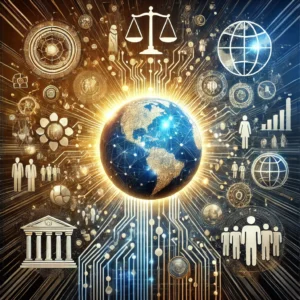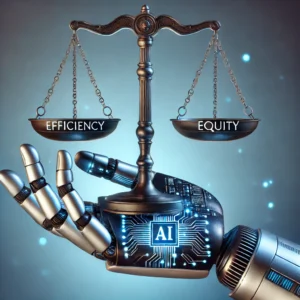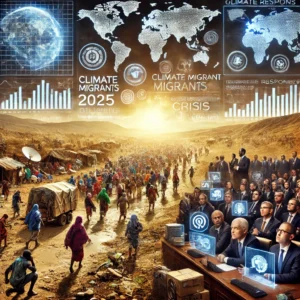
Have you ever paused to wonder how Artificial Intelligence (AI) might quietly reshape every corner of our planet—economies, communities, personal freedoms—even as we go about our daily chatter on smartphones and video calls? If yes, you’re not alone. Conversations about “AI ethics” are filling conference rooms, living rooms, and social media feeds. From lively youth advocacy to solemn parliamentary discussions, there’s a global movement aiming to craft governance frameworks that will keep AI beneficial, equitable, and transparent. After all, it’s 2025, and the race to regulate AI responsibly has never been more pressing.

The Rapidly Changing World of AI Oversight
AI accountability has galloped ahead of the bureaucratic clock, leaving many governments sprinting to create or refine their policies. A few years back, some folks thought AI ethics was an abstract concern. But the swift arrival of AI tools in education, healthcare, finance, and the corners of everyday life has proved how tangible—and urgent—this issue truly is. Drafting global policy on AI ethics involves a puzzle of competing interests: privacy advocates, large tech conglomerates, rights organizations, and everyday citizens with different cultural values. Indeed, forging a universal approach that everyone trusts can feel a bit like herding cats.
Interestingly, a collaborative spirit is emerging among major nations that were once purely competitive in the tech race. The U.S. Office of the Science and Technology Adviser (source) has steered new legislative efforts to encourage data transparency. The European Union, meanwhile, pushes the AI Act forward, with IBM and other tech giants voicing support for risk-based approaches to AI oversight (source). And UNESCO’s Recommendation on the Ethics of Artificial Intelligence (source) has been widely cited across policymaking arenas. Despite occasional policy gaps or misaligned frameworks, this synergy points to a remarkable shift: countries recognize they can’t tackle AI ethics in isolation.
Government Notes and Political News: Policies in the Spotlight
Politics is swirling around AI ethics, and 2025 has turned into a year of spirited parliamentary debates. Sometimes, these sessions get entangled in rhetorical back-and-forth—a bit reminiscent of a family quarrel that meanders between small talk and grand proclamations—yet crucially, they’re happening. For instance, the UK Parliament has revisited AI governance proposals, referencing insights from NIST (National Institute of Standards and Technology) about risk management frameworks (source). Across the Atlantic, the U.S. Federal AI Governance blueprint (source) highlights accountability. And the G20 summits increasingly revolve around AI’s societal impacts—more so than just trade imbalances or traditional diplomatic conflict.
Governments everywhere appear to be calibrating their moral compass on AI. India’s Ministry of Electronics and Information Technology has introduced guidelines that echo the need for inclusive, non-discriminatory algorithms. In some places, though, the conversation can be contradictory. Leaders express excitement about leveraging AI for “smart governance,” but they also worry about job displacement. Hiccups in coherence are inevitable. Even so, each political speech or draft legislation is a stepping stone for building robust governance frameworks. These official measures reflect a deepening acknowledgment that AI’s benefits go hand in hand with safeguarding civil rights and ethical values.
Research Labs and Scientists: The Beating Heart of AI Innovation
At the nexus of AI progress are research labs—both private and university-based—buzzing with experiments on advanced machine learning models, quantum computing, and neural network breakthroughs. Scientists from Sciencedirect’s published studies (source) have argued that ethical design must be woven into AI prototypes at inception. This notion calls for “responsible innovation,” where researchers and developers mitigate biases and potential harms before these systems even see the light of day. Rather than retrofitting ethics, the ethicists are right there with the coders, ensuring risk assessments aren’t just afterthoughts.
Many large corporations fund specialized research labs exclusively tasked with investigating AI fairness and transparency. Some cross-disciplinary teams fuse data scientists, sociologists, psychologists, and ethicists under one roof. They examine how an AI’s predictions might inadvertently discriminate against minority communities or propagate harmful stereotypes. Critics occasionally question whether private labs—directly or indirectly reliant on corporate money—might compromise on thorough objectivity. However, in 2025, we’re seeing more external auditing. NIST’s AI Policy Contributions push for verifiable oversight (source) to ensure these labs uphold transparency, even if they must occasionally navigate conflicting commercial pressures.
Just imagine a subtle but meaningful tension in a lab corridor: a lead data scientist wants to deploy a cutting-edge model swiftly, while the ethicist lobbies for more rigorous bias checks. Sometimes, the conversation may sound contradictory or slightly awkward—two brilliant minds grappling with time constraints, corporate objectives, and moral accountability. Striking that balance is no easy feat, but it shapes AI’s trajectory in ways that might define the next century.
Celebrity Endorsements: Star Power in AI Ethics
When a household name like an A-list actor or a chart-topping musician draws attention to AI’s ethical pitfalls, people listen—perhaps more than when a stiff policy paper circulates in a niche academic journal. Odd, isn’t it? Celebrities often become the catalysts for public discourse, using their platforms to demand accountability. Some have criticized AI’s potential to manipulate deepfakes, produce false celebrity endorsements, or even supplant real performers with synthetic “digital humans.” In fact, a few big stars from Hollywood have openly expressed support for stringent AI content regulations, emphasizing how such measures can protect intellectual property.
By 2025, we’ve also witnessed philanthropic initiatives from the entertainment industry. A prominent pop icon, for instance, might fund scholarships to train young women in AI ethics. Another celebrity invests in social media awareness campaigns that educate fans about spotting AI-generated misinformation. These star-powered gestures might seem superficial at first glance, but they bring mainstream attention to topics once tucked away in academic corners. Sure, sometimes their interviews drift off into comedic tangents—like that one public figure who joked about an AI takeover reminiscent of a 1980s sci-fi flick. But beyond the amusing slip-ups, these endorsements rally a broader audience toward responsible AI governance, reinforcing that ethical AI isn’t just for policy wonks or big tech CEOs.
Perspectives of Older Adults: Concerns and Hopes
Many older individuals remember a time when the most advanced “tech” at home was a television set with rabbit-ear antennas. So it’s no surprise that AI can occasionally look both mystifying and intimidating to them. On the flip side, older citizens stand to benefit substantially from AI-driven healthcare—telemedicine consultations, AI-based personal assistants that remind them to take medication, or assistive robots for daily tasks. In lively community center discussions, some retirees express excitement about how these technologies could improve independence and overall quality of life. Yet others fret about privacy invasions: “What if it tracks everything I do?” is a genuine worry.
In 2025, governments have launched public education initiatives, sometimes in partnership with community organizations, to offer digital literacy classes specifically for seniors. But let’s be honest, bridging that generational gap can be awkward. Digital adopters at advanced ages might find themselves enthralled by AI’s possibilities one minute and, in the very next breath, deeply suspicious of data-mining. There’s a contradiction in their sentiments—similar to how they might love the convenience of a smartphone while lamenting the loss of face-to-face communication. This tension is real and underscores the importance of ensuring AI ethics frameworks remain inclusive of older adults’ perspectives.
Social Aspects and the Cultural Mosaic
AI does not operate in a vacuum. It permeates social structures, cultural values, and collective behaviors. The notion of “global policy on AI ethics” aims to unify these diverse threads, but local customs often demand unique solutions. Take an example: In certain rural regions, skepticism about AI can stem from religious or traditional beliefs. In other communities, AI-enabled solutions like precision agriculture or remote education are seen as life-changers. Then you have city dwellers who rely on digital payment systems and AI-curated streaming platforms, typically wanting robust regulations to prevent data exploitation.
Every so often, you find yourself in a group conversation about AI ethics where one person exclaims, “We absolutely need government regulation!” while another counters, “The free market drives better innovation!” These philosophical differences can be further shaped by socioeconomic status, access to resources, or personal experiences with data privacy breaches. Indeed, the pursuit of a single, universal policy on AI might come across as a utopian dream. Yet local voices are increasingly influencing global dialogues, nudging policymakers to integrate cultural specificities into AI governance frameworks.
Balancing these viewpoints can yield contradictory or ambiguous policy statements. Politicians attempt to incorporate fluid language that respects cultural variations. One might read an official transcript riddled with seemingly conflicting bullet points, each introduced after hearing a new stakeholder group. Frustrating as it may be, this is also a testament to the complexity of ethical policymaking in a diverse global community.
Youth Perspectives: Driving Innovation and Protest
If older generations often approach AI with a mix of awe and caution, young people have grown up alongside powerful tech tools, blending daily life with smartphone apps, VR gaming, and social media chatbots. It’s almost second nature to them. Yet there’s a fiery protest streak among the youth, especially those in high schools or universities. Many are enthusiastic about AI’s ability to spur scientific discoveries—like advanced climate modeling or the potential for disease cures. At the same time, young activists are quick to point out the potential for data-based discrimination and privacy violations.
College campuses in 2025 regularly host AI-themed hackathons—often featuring “ethical track” categories. I once witnessed a group of engineering students, brimming with adrenaline and energy drinks, pivot from building a voice assistant to tackling user privacy concerns halfway through the competition. It wasn’t the smoothest transition, but they recognized that you can’t just chase technical achievements without grappling with the moral dimension. Their changes in direction might appear haphazard or contradictory—are they prioritizing innovation or ethics? Well, maybe both. Youthful exuberance, combined with social media mobilization, ensures that AI accountability resonates far beyond academic circles. Indeed, a single viral TikTok by a teenage coder can spark a nationwide conversation on AI governance.
Global Business and Revenue: An Exploding Market
Let’s not ignore the economics. The global AI market has mushroomed, pulling in revenues that major consultancies estimate to surpass trillions by the end of the decade. Corporations are funneling massive budgets into AI R&D, anticipating handsome returns on investment. From e-commerce recommendation engines to autonomous vehicles, AI’s commercial applications seem endless. However, with big money comes big responsibility—or at least it should. Investors and stockholders increasingly want to avoid reputational damage linked to unregulated or unethical AI deployments. You can’t quite ring the cash register while ignoring calls for robust consumer protections.
The business argument for an ethics-forward approach hinges on trust. Nefarious AI usage—think manipulative facial recognition or invasive data scraping—risks public backlash and potential lawsuits. Already, legislative proposals in the U.S. and the EU are discussing hefty fines for companies that misuse AI. The NTIA (National Telecommunications and Information Administration) accountability policy report (overview) specifically highlights the financial repercussions of unethical or non-compliant AI. The fear of these penalties has CEOs and CFOs taking note, if only to protect profit margins. As a result, entire boards of directors now weigh in on AI ethics, a topic that once might have seemed too niche for mainstream corporate agendas.
That said, occasionally you catch a dissonance in corporate boardrooms. Senior leadership might extol the virtues of ethical AI in public statements yet push for rapid product launches under the table—perhaps skipping thorough audits to outpace rivals. It’s a push and pull that leads to occasional slip-ups. Whether these stumbles come from misguided ambition or simple oversight, they fuel the argument that robust governance structures are needed to keep AI innovation from running amok.
Emerging Frameworks: Collaboration Across Borders
It’s fascinating to watch countries—historically cautious about sharing sensitive data—cooperate on an issue as politically and economically charged as AI. For instance, the Global Partnership on AI brings together government representatives, academia, and industry from multiple regions. They hammer out best practices and encourage uniform guidelines on data privacy, accountability, and safety. Even the United Nations has stepped up its efforts through specialized working groups. UNESCO’s Recommendation on the Ethics of Artificial Intelligence (source) has catalyzed many of these international dialogues.
Regional alliances, like the African Union’s continental strategy for AI or ASEAN’s emerging framework on digital ethics, add new layers to the conversation. In some cases, these frameworks run parallel to Western-led initiatives, injecting fresh perspectives about equity and local autonomy. There can be friction—some guidelines mention prioritizing local data sovereignty, while others stress the necessity of global interoperability. Certain committees find themselves entangled in labyrinthine negotiations to incorporate cultural nuances without undermining universal principles. The results may not always be elegantly coherent, but they’re forging new diplomatic channels to handle AI’s cross-border nature.
Tensions, Contradictions, and Innovations
Let’s face it: AI ethics is not a monochrome story of progress. It’s riddled with controversies. Governments wrestle with surveillance technologies that promise crime reduction but also threaten civil liberties. Tech companies champion data-driven medicine while critics worry about the commodification of patients’ personal health data. Politicians hail predictive policing, yet civil rights activists argue it perpetuates historical discrimination. Sometimes a policy that aims to strengthen security ironically diminishes personal freedoms. Are we progressing or regressing? The answer may depend on whose vantage point you take, creating pockets of contradictory viewpoints that swirl around the same table.
Such tensions can light the spark for innovation. When engineers and ethicists clash, the resulting compromise might lead to novel auditing frameworks, explainable AI designs, or advanced encryption methods. Scientists at government-funded labs occasionally speak of “constructive friction.” The friction can be chaotic—some might label it confusing or downright aggravating—but it also pushes boundaries. Meanwhile, grassroots organizations keep an eagle eye on how these developments might affect marginalized groups. In some localities, you see pilot programs testing “transparent AI.” Tools that show, in real time, the logic behind a machine’s decisions. These testbeds may not be perfect. They might glitch or produce awkward outputs now and then. But these experiments herald a new era of accountability.
Societal Reflection: Stories and Anecdotes
If you wanted a purely academic discussion, you’d open a weighty journal. But real-life stories sometimes capture ethical dilemmas more vividly than any policy text. A mother in Brazil shares how an AI scholarship application system flagged her academically gifted child as “high-risk”—for reasons that were never disclosed. She eventually uncovered that the algorithm had used historical data skewed by socio-economic factors. The shock made her question the illusions of AI objectivity and spurred her to contact local NGOs advocating for fair AI.
Another anecdote emerges from a rural farming community in India, where an AI-driven weather prediction tool saved an entire season’s crops from a surprise drought. Older farmers, initially skeptical, gradually embraced digital solutions that offered real help. Yet some grew anxious about data collection: “Does the government see all our farmland details?” These personal narratives embody the complexities that must be addressed. Gains and fears walk hand in hand. And they highlight why forging robust global policy is not merely an academic exercise—real lives depend on getting AI ethics right.
Bumps on the Road: Setting Standards and Enforcement
For every well-intentioned policy, one question lingers: who enforces it, and how? Global guidelines can be hammered out, but enforcement often rests with individual nations. Some deploy specialized agencies to audit AI systems, but these agencies may lack resources or face legal constraints. Others rely heavily on self-regulation by the private sector, which, let’s be real, can be like putting the fox in charge of the henhouse. Non-governmental watchdogs, like certain philanthropic foundations or cross-border consortia, can step in to fill gaps in oversight. But even they wrestle with scattered authority.
Hence, the impetus on developing robust policy instruments that have real teeth. The U.S. Federal AI Governance proposals mention stiff fines for companies that fail to meet transparency standards (source). The EU’s AI Act contemplates a tiered approach to regulation—higher-risk applications require more stringent evaluations. Asia-Pacific countries, for their part, experiment with hybrid models. While these frameworks may differ in details, a shared principle emerges: accountability is key. The subtle errors in policy wording, or the occasional contradictory directive, are challenges that must be ironed out. Yet the momentum in 2025 suggests that uniform enforcement standards, though elusive, are inching closer to reality.
The Futuristic Outlook: AI Ethics Beyond 2025
As we peer further into the decade, it’s worth acknowledging the breathtaking pace at which AI evolves. Quantum computing, for instance, might unlock computational powers that today seem unimaginable. Or advanced generative models could produce immersive, lifelike simulations that blur the line between virtual and real. These leaps pose fresh ethical puzzles: If an AI can mimic a person’s voice, accent, or even entire persona, how do we shield identities from exploitation? In the near future, entire layers of our legal systems might need to be reconfigured to handle AI crimes or AI-mediated civil disputes.
On a rosier note, plenty of luminaries anticipate AI breakthroughs in medicine, energy efficiency, and climate adaptation. Some cutting-edge labs propose that ethically aligned AI could solve global crises—accelerating vaccine development or optimizing carbon capture solutions. Celebrity advocates dream of philanthropic possibilities, from remote education in impoverished areas to AI-based wildlife conservation that halts extinction. Youth activists—still more plugged in than ever—want that future to be green and fair. On the other hand, skeptics, often older or with deeply ingrained caution, worry about disruptions to workforce stability, erosion of human agency, and possible overreliance on AI. At times, these discussions feel disjointed, like a puzzle missing pieces. Yet forging alliances among these varied voices is exactly what propels the global policy conversation forward.
Calls to Action and Personal Responsibility
If you’re reading this, you might wonder: “What can I do to influence AI ethics?” You’re not just a bystander. Your choices as a consumer, voter, or professional shape how AI evolves. Supporting businesses that adopt transparent data practices, questioning politicians about their AI regulatory stances, and sharing knowledge with people who feel overwhelmed by AI’s complexities—all these actions matter. AI governance is no longer the exclusive domain of tech experts or policy elites. It’s a societal project.
Take a moment to consider your own workplace. Maybe you’re a product designer at a startup. Integrate an “ethical review” step in the design pipeline. Or if you’re an educator, highlight AI literacy in your curriculum. Celebrated actors, major governments, research labs, and community activists all converge on one truth: The future of AI needs everyone—young or old, rich or poor, famous or unknown—invested in setting the right moral compass. It might be messy and inconsistent at times, but only through collective effort can we ensure AI fosters a more equitable world.
A Gentle Nudge to the Curious Reader
You’ve traveled through the labyrinth of AI ethics, exploring the perspectives of political leaders, scientists, celebrities, seniors, youth, and businesses with immense stakes. If you feel slightly dizzy from the back-and-forth of contradictory viewpoints, you’re not alone. This is a grand tapestry, woven from multiple threads, some bright, some dark, and some shimmering in unpredictable ways. We can’t promise a perfectly symmetrical pattern of outcomes, but if we keep paying attention, asking questions, and collaborating across borders, we can guide AI toward more beneficial, ethical, and unifying paths.
Do explore external resources that shape the current AI ethics landscape:
- UNESCO – Recommendation on AI Ethics
- IBM’s Perspective on the EU AI Act
- Sciencedirect’s Studies on AI Governance
We invite you to stay engaged, question the status quo, and help craft the next phase of AI ethics policies. In a world where technology runs faster than you can type “Hello, AI,” your voice has weight.
Frequently Asked Questions (FAQs)
1. How are major governments collaborating on AI ethics?
Many governments have signed international agreements or joined alliances like the Global Partnership on AI. They share research and best practices while building a foundation for consistent frameworks. Bodies like UNESCO, the EU, and various national regulatory agencies are central to driving these cooperative efforts.
2. Why are celebrities so vocal about AI ethics?
Celebrities often have massive platforms that can elevate public discussion quickly. They also face direct impacts—for example, concerns about deepfakes or AI impersonations of their likeness. By championing responsible AI, they raise awareness among fans who might not regularly follow policy debates.
3. What role do research labs play in AI governance?
Research labs, whether corporate or academic, are innovation powerhouses that shape AI technologies from the ground up. They develop new algorithms and tackle questions of bias, fairness, and safety. Many labs now collaborate with ethicists, implementing guidelines that anticipate ethical dilemmas before deployment.
4. Are older adults resistant to AI adoption?
Not necessarily. While some older adults feel uneasy about complex technologies, many embrace AI for healthcare, social connectivity, and daily convenience. Public education programs and user-friendly designs can ease concerns and highlight potential benefits.
5. Will AI ethics restrict innovation?
Proper regulations aim to foster responsible innovation rather than limit it. A well-defined ethical framework provides clarity for developers, investors, and the public, potentially increasing trust and accelerating the mainstream adoption of truly beneficial AI systems.





